
About
I am an ethnographer and historian of Afro-Diasporic and Latin American religions. I specialize in the study of Cuban Lucumí (popularly called Santería) and other innovative systems of belief and practice that crystallized in the Americas: Brazilian Candomblé, Haitian Vodou, Puerto Rican Espiritismo, and Venezuelan Maria Lionza, among others. More broadly, my interests include the poetics and politics of Caribbean altar displays, the construction of historical memory through ritual performance, and women’s religious leadership across the Afro-Atlantic world. I am also drawn to investigating the social life of things—ephemera such as chromolithographs of Black Madonnas, to cite the focus of one ongoing project—in order to delve into quintessentially human forms of sociality, labor, and desire.
My first book, Religion in the Kitchen: Cooking, Talking, and the Making of Black Atlantic Traditions, was published in 2016 by New York University Press as a “signature book” in its North American Religions series. Along with my recent publications, this manuscript draws on several years of participant observation in Ilé Laroye, a predominantly African-American community based on the South Side of Chicago dedicated to Lucumí and related Afro-Caribbean traditions. Religion in the Kitchen centers on the preparation of food for West and Central African spirits and the exchange of stories about initiation. The thesis of the book is that both sets of routines, best described as “micropractices,” demand analysis as rituals in their own right and have proven vital to the existence of Black Atlantic religions.
My next research project examines the challenges faced by transgender and transsexual people as religious actors in the contemporary United States. As a University of California President’s Postdoctoral Fellow in 2010– 2011, I carried out interviews and fieldwork on the role of religion in the lives of trans people, asking: What is the relationship between gender and sexuality in Afro-Diasporic traditions? How do trans religious practitioners negotiate their investment in traditions that simultaneously reify and contest essentialist conceptions of gender? When might transgender operate as a religious (as well as a social and cultural) category? In the context of my current investigation, I seek to illuminate how those doubly marginalized—for their ethnic/racial identities and their gender presentation—make themselves at home in their chosen traditions.
.
Finalist for the 2025 Alta California Chapbook Prize
.
Finalist for the inaugural (2024) Cardinal Poetry Prize
sponsored by Wesleyan University Press
for Lessons in Cuban Cosmology: Fifty-Two Poems & a Villanelle
.
Publications

The Gut: A Black Atlantic Alimentary Tract, Cambridge University Press, 2022
WINNER – 2024 Leonard Norman Primiano Book Prize on Vernacular Catholicism, awarded by the American Folklore Society
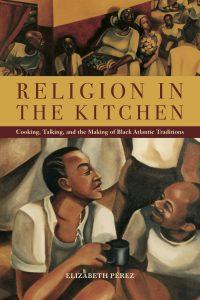
Religion in the Kitchen: Cooking, Talking, & the Making of Black Atlantic Traditions, New York University Press, 2016
WINNER – 2017 Clifford Geertz Prize in the Anthropology of Religion, awarded by the Society for the Anthropology of Religion at the 2017 American Anthropological Association Annual Meeting
WINNER – 2018 Women’s Spirituality Book Award, presented by the California Institute of Integral Studies to honor 100 of the best new books in the genre of Women’s Spirituality
HONORABLE MENTION – 2019 Barbara T. Christian Literary Award, given by the Caribbean Studies Association
FINALIST – 2017 Albert J. Raboteau Prize for the Best Book in Africana Religions, presented by the Journal of Africana Religions
Articles & Book Chapters & Poetry
- Stephan Palmié’s review of The Gut: A Black Atlantic Alimentary Tract, Elizabeth Pérez’s review of Palmié’s Thinking with Ngangas: What Afro-Cuban Ritual Can Tell Us about Scientific Practice and Vice Versa, and their responses to each other’s reviews, Religion and Society 15, no. 1 (2024): 265–271.
-
“‘Unique, Divine, Unrepeatable’: S. F. Makalani-MaHee and the Black Trans Christian Archive,” QTR: A Journal of Trans and Queer Studies in Religion 1, no. 2 (2024): 217–243.
- “Sorry Cites: The(Necro)-Politics of Citation in the Anthropology of Religion,” Studies in Religion 53, no. 2 (2024): 185–206.

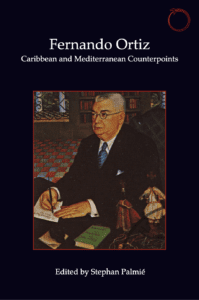
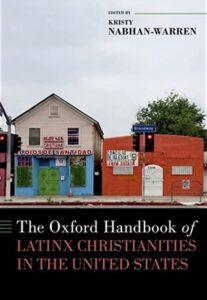
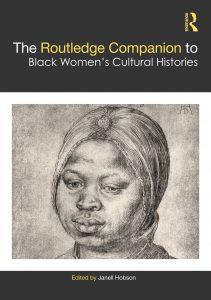

- “Remittances,” Meridians: Feminism, Race, Transnationalism 21, no. 1 (2022): 155–57.
- “‘I Got Voodoo, I Got Hoodoo’: Ethnography and Its Objects in Disney’s The Princess and the Frog,” Material Religion (2021) [proofs].

- “Curator’s Note,” “Lottery,” “Visitation from the Once and Future Pride of Black Arkadelphia,” “Santeros,” and “Chicago Piropo,” Chicana/Latina Studies 20, no. 1 (2020): 160–69.
- “‘You Were Gonna Leave Them Out?’: Locating Black Women in a Transfeminist Anthropology of Religion,” Journal of Feminist Anthropology 2, no. 1 (2020): 94–111.

- “One Good Reason,” American Religion 1, no. 1 (2019): 149–50.
- “Toward an Inventory of Influence: Biography and Belonging in Sustained Dialogue with Black Atlantic Religion,” Journal of Africana Religions 6, no. 1 (2018): 104-13.
- “Bark,” “Bárbara,” “Dolor,” “For the Detainee’s Fiancée,” “The Diviner’s Verse,” and “On the Godson’s Conception” (in a collection entitled Tough Beef & Maiden Baobab) for The Immanent Frame: Secularism, Religion, & the Public Sphere as part of its tenth anniversary project, “Is This All There Is?” January 29, 2018.
- “The Ontology of Twerk: From ‘Sexy’ Black Movement Style to Afro-Diasporic Sacred Dance,” for African and Black Diaspora 9, no. 1 (2016): 16-31, special issue: “Sounds of Freedom Across the Black Atlantic.”

- “Girlhood: In Cantos,” WSQ (Women’s Studies Quarterly) 43, no. 3 & 4 (2015): 137–40, special issue on the 1970s.
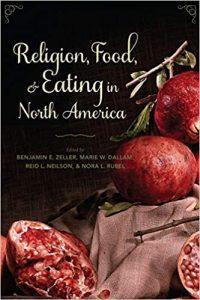
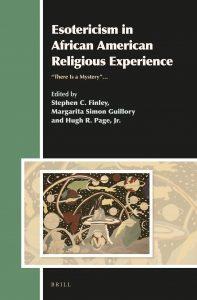
- “Working Roots and Conjuring Traditions: Relocating ‘Cults and Sects’ in African American Religious History” in Esotericism, Gnosticism, and Mysticism in African American Religious Experience, edited by Stephen C. Finley and Margarita Guillory, Brill, 2014.
- “Portable Portals: Transnational Rituals for the Head Across Globalizing Orisha Traditions,” Nova Religio 16, no. 4 (2013): 35-62, special issue: “Religion and the Transnational Imagination.”
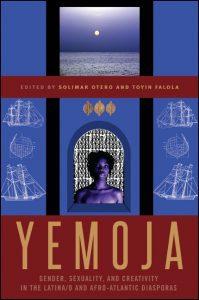
- “Nobody’s Mammy: Yemayá as Fierce Foremother in Afro-Cuban Religions,” in Yemoja: Gender, Sexuality, and Creativity in the Latina/o and Afro-Atlantic Diasporas, 1-20, edited by Solimar Otero and Toyin Falola, SUNY Press, October 2013.
- “Willful Spirits and Weakened Flesh: Historicizing the Initiation Narrative in Afro-Cuban Religions,” Journal of Africana Religions 1, no. 2 (2013): 151-93.
- “Staging Transformation: Spiritist Liturgies as Theatres of Conversion in Afro-Cuban Religious Practice,” Culture and Religion 13, no. 3 (2012): 372-400.
- “Cooking for the Gods: Sensuous Ethnography, Sensory Knowledge, and the Kitchen in Lucumí Tradition,” Religion 41, no. 4 (2011): 665-83.
- “Spiritist Mediumship as Historical Mediation: African-American Pasts, Black Ancestral Presence, and Afro-Cuban Religions,” Journal of Religion in Africa 41, no. 4 (2011): 330-65.
- “The Virgin in the Mirror: Reading Images of a Black Madonna Through the Lens of Afro- Cuban Women’s Experiences,” Journal of African-American History 95, no. 2 (2010): 202-28, special issue: “Explorations within the African Diaspora.”

- “Found in Translation,” in Telling Tongues: A Latino/a Anthology on Language Experience, edited by Louis Mendoza and Toni Nelson-Herrera (National City: Calaca Press, 2007), 45.

- “Writing My Will” and “The Assumption” in El Coro: A Chorus of Latino and Latina Poetry, edited by Martín Espada, and winner of a Gustavus Myers Outstanding Book Award (Amherst: University of Massachusetts Press, 1997), 110–13.
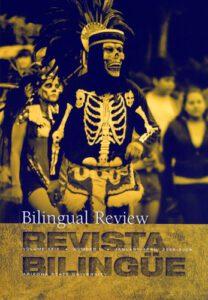
- “Forfeitures,” “Six Eulogies for a Cuban Exile,” and “Writing My Will,” Bilingual Review/La Revista Bilingüe 21, no. 1 (January-April): 76–81.